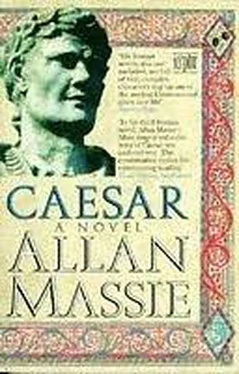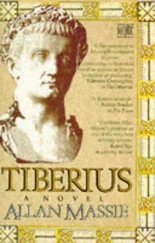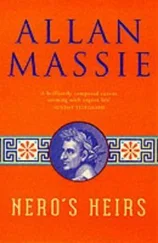Allan Massie - Caesar
Здесь есть возможность читать онлайн «Allan Massie - Caesar» весь текст электронной книги совершенно бесплатно (целиком полную версию без сокращений). В некоторых случаях можно слушать аудио, скачать через торрент в формате fb2 и присутствует краткое содержание. Жанр: Исторические приключения, на английском языке. Описание произведения, (предисловие) а так же отзывы посетителей доступны на портале библиотеки ЛибКат.
- Название:Caesar
- Автор:
- Жанр:
- Год:неизвестен
- ISBN:нет данных
- Рейтинг книги:3 / 5. Голосов: 1
-
Избранное:Добавить в избранное
- Отзывы:
-
Ваша оценка:
- 60
- 1
- 2
- 3
- 4
- 5
Caesar: краткое содержание, описание и аннотация
Предлагаем к чтению аннотацию, описание, краткое содержание или предисловие (зависит от того, что написал сам автор книги «Caesar»). Если вы не нашли необходимую информацию о книге — напишите в комментариях, мы постараемся отыскать её.
Caesar — читать онлайн бесплатно полную книгу (весь текст) целиком
Ниже представлен текст книги, разбитый по страницам. Система сохранения места последней прочитанной страницы, позволяет с удобством читать онлайн бесплатно книгу «Caesar», без необходимости каждый раз заново искать на чём Вы остановились. Поставьте закладку, и сможете в любой момент перейти на страницу, на которой закончили чтение.
Интервал:
Закладка:
… It is a paradox, Mouse, which you have understood in Homer. We act by reason of the force of our will, and yet Destiny governs all. What shall I do with Pompey when I take him, Mouse?"
That was another question I found hard. With what crime could Pompey be charged? Though we were sure that Caesar's decision to invade Italy was justified, nevertheless Pompey had opposed us by the will, the explicit order, of the Senate. I could not conceive of any legal action that could be brought against him, and I could not believe that Caesar would willingly order any Roman citizen — least of all Pompey, who had once been married to his daughter Julia — to be put to death without trial. Besides, how often had I heard Caesar deplore the conduct of Sulla who had restored order to Rome after an earlier civil war by murdering his enemies.
I said: "I cannot believe that Pompey will choose to survive his disgrace."
"You don't know Pompey, Mouse. He will not feel disgraced. He will feel he was betrayed. He will be full of resentment, not shame. Resentful men do not fall on their sword. How calm the night is, a night for talk of love, not death. Have you broken with Clodia, Mouse?"
I had not imagined that Caesar knew of my passion for the lady. I did not reply.
"She will bring you nothing but harm," Caesar said. "Besides, she's old enough to be your mother."
I wonder if he thought then of that morning when I had seen him emerge from my mother's room. Perhaps not; great conquerors can't be expected to recall their every conquest.
We sighted Alexandria early on a bright morning. It was late summer and not yet hot. The city shone before us. I had not imagined so many white and sparkling palaces or the beautiful curves of coast and harbour. Gardens of villas brilliant with flowers, ran down to the water.
Then a galley put out from the port to meet us. Caesar smiled. He was sure that it contained a deputation of notables come to honour him. He was (as usual) right. They boarded our ship, some of the older ones finding the transition difficult, and being forced into ludicrous positions. A bald man, with deep brown eyes and sagging jowls, advanced towards Caesar. He introduced himself as their spokesman, by name Theodotus, a Greek who had won some celebrity, as I learned subsequently, as a professional lecturer; his counsel was now said to be valued by the young King Ptolemy, whose tutor he had formerly been.
"And more than tutor, I'll wager," Casca said.
Now Theodotus extended his left arm in one of those exaggerated gestures which are the stock-in-trade of the professional rhetorician, beings never far divorced from the world of the actor.
Two Nubian slaves, tall glistening fellows, naked but for loincloths and elaborate head-dresses, responded. The taller of them dived into a basket and withdrew an object wrapped in cloth. There was clearly going to be some sort of presentation. The second Nubian spread a carpet before Caesar and remained kneeling, while his companion also knelt and began to unwrap the parcel. He removed a succession of cotton cloths. The first two were crimson, the third white with a brownish stain.
"Now," Theodotus cried, his voice commanding.
It was years since I had seen Pompey in the flesh, and at first I was not certain it was the flesh. I thought they had toppled a statue and removed the head as an earnest of their benevolent intentions towards Caesar.
But Caesar stepped back, threw his hands up, covered his face as a widow does. The Nubian adjusted the position of the severed head. I was standing at an angle and it seemed as if Pompey was smiling. But that must have been some optical delusion.
Trebonius stepped forward, and, twitching a cloth from the Nubian, covered Pompey's head.
Theodotus was speaking. I think he was claiming credit for himself in the organisation of the assassination of Caesar's enemy. He stretched out his hand towards the General, opening it to reveal a ring. Caesar, as if he acted without thought, took the ring, held it up for a moment, and passed it to me: the engraving showed a lion holding a sword between his paws.
Theodotus said: "He was endeavouring to form an army, to maintain the prosecution of this terrible war which has been so grievous to all lovers of Rome, of peace and of Caesar. He had partisans in the city, adherents of the King's sister who has set herself up against His Majesty. It was necessary to act. We did so for the safety of Egypt and out of friendship for Caesar." He bowed low. "Dead men don't bite, General," he said.
We were all horrified by what we had seen; yet we stood there and listened as this well-larded man, whom I had at once marked as a consummate hypocrite, argued that it was greatly to Caesar's advantage both that Pompey should be dead, and that he himself should have played no part in the execution of his rival. "You may consider, Caesar, that in our zeal to do you service, we have acted, with u ncommon dexterity and good judg ment, as a species of deus ex machina."
And Caesar, though he stood there weeping, could not hide the truth of these words from himself.
"When Caesar has had time to reflect, he will understand that our gift to him is priceless. Now he may indulge in grief for his dead rival, his former friend, but when he retires tonight, his heart will swell with the knowledge that we have done for him what he would have had done, and that he is yet innocent of Pompey's blood."
He then invited Caesar to take up residence in the royal palace as the guest of his absent majesty.
"It seems to me," Artixes said, "that Caesar was at least as great a hypocrite as this Greek whom you revile, for he must have been pleased just as the Greek assured him he would be."
"Of course," I said, "but his tears were genuine none the less. You have heard what he said about Pompey. You must understand the solitude he knew when he saw that Pompey was no more."
And then I recited to the boy that great passage in which Homer tells how the aged Priam came to the Greeks' camp to beg the body of his slaughtered son, the hero Hector. I forgot in my emotion that Artixes does not understand Greek, but he listened intently. I suppose the music captivated him. Besides, barbarians are accustomed to long paeans of praise for dead heroes, and I don't suppose they listen carefully to the words.
I did not tell him that that evening Caesar said to me:
"First Crassus, then Pompey. Their heads looked well set on their shoulders back at Lucca."
"I saw how deeply you were moved, General."
"Cruel necessity, Mouse. Never lose the capacity to weep. Nothing unmans a man so surely as the refusal or inability to cry at appropriate moments."
It was soon evident that, despite the murder of Pompey, our situation in Alexandria was full of danger. As I have said, Caesar had rashly brought only a small force with him. The Egyptian army, though probably contemptible, was large. There were also troops composed of Roman veterans, old soldiers of Gabinius, who had remained in the country, and had now been re-formed in the semblance of an army. No one could be sure whom they obeyed. Most dangerous of all was the Alexandria mob. Trained legionaries may have no fear of regular troops, but they hate street-fighting against an enemy that is hard to identify, that comes and goes, that resorts to murder in back alleys, that profits from its own irregular nature.
Caesar was aware of these dangers, yet seemed careless of them. When news came that Pothinus, a palace eunuch, had summoned troops from Pelusium, and given command to Achillas, the officer who, we believed, had murdered Pompey, Caesar was strangely indolent. He remained in the palace near the harbour working on his memoirs of the Gallic War. I urged him to action; he merely smiled. "Time enough," he said. I could not understand his lassitude.
Читать дальшеИнтервал:
Закладка:
Похожие книги на «Caesar»
Представляем Вашему вниманию похожие книги на «Caesar» списком для выбора. Мы отобрали схожую по названию и смыслу литературу в надежде предоставить читателям больше вариантов отыскать новые, интересные, ещё непрочитанные произведения.
Обсуждение, отзывы о книге «Caesar» и просто собственные мнения читателей. Оставьте ваши комментарии, напишите, что Вы думаете о произведении, его смысле или главных героях. Укажите что конкретно понравилось, а что нет, и почему Вы так считаете.












